Make it yours
Every experience is customised to be just right for you.
WILDLIFE VOLUNTEERING: THE RED FLAGS MOST PEOPLE MISS
Learn more
Gain exposure to iconic African wildlife in a veterinary setting. Venture into the field to observe and assist with wildlife management activities. Get to grips with a dart gun on the ground and in a helicopter. And join specialist teams protecting rhinos and lions from poachers and other illicit trades.
Our expedition is the perfect introduction to everything that makes wildlife veterinary practice in Africa so thrilling and rewarding. Whether you’re treating, managing or protecting animals, you’ll connect with wildlife professionals - and gain expert insights into endemic diseases, treatments, drugs and conservation challenges that are unique to Africa.



Gain hands-on experience working with lions in captivity. You’ll assist in necessary veterinary procedures such as sterilisation and collaring as well as daily care such as meal preparation and cleaning.
You’ll join a specialist team carrying out procedures in the field. These could include the capture and relocation of species such as giraffes to manage population numbers, or testing buffalo for disease in a field clinic to prevent an outbreak of bovine tuberculosis or corridor disease.
You’ll receive briefings before all procedures, explaining why it’s needed and how to perform specific techniques - alongside any species-specific information relevant to the case.
You’ll spend two nights in the Kruger National Park exploring the various habitats that make up this vast, intact ecosystem. Guided by a highly knowledgeable conservationist, you’ll search for and learn about a wide variety of flora and fauna - not just the famous Big 5.
Vets are the first line of defence in key conservation issues like maintaining genetic diversity and disease management. You’ll assist the vets with management and clinical procedures that support the long-term survival of iconic species.
You’ll only work on real cases that are in the animal’s best interests. Procedures like rhino horn trimming are carried out periodically but the vets don’t perform these solely for training purposes as they can cause distress to the animals.
You’ll assist with vital hands-on work to protect wild rhinos from poachers. This could include procedures such as horn-trimming, fitting ankle collars, ear notching and population management.
An essential tool for tranquilising large animals in the field, you’ll learn to aim and shoot a dart gun with skill. Once you feel confident darting on the ground, you’ll be taken up in a helicopter to shoot a human-made practice target from the air.
You’ll join a real veterinarian on their day-to-day casework. What you’ll do depends on which animals are being treated at the time, what kind of care they need, and your level of experience. Because this is a real veterinary environment and not set up for tourism, the work depends on what cases arise. Your veterinary priorities will include a range of the following activities.
You will get to observe or assist one of these procedures:
You will receive training in:
You could also observe or assist:
You will get to observe or assist:
You could also observe or assist:
You will get to observe or assist:
You could also observe or assist:
You will get to experience:
You’ll learn about wildlife behaviour, biology and veterinary care, as well as broader conservation issues. Depending on the animals being treated, this will include a range of the following topics.
This project contributes to a variety of the UN’s Sustainable Development Goals. As part of the team, so will you.
The content of this publication has not been approved by the United Nations and does not reflect the views of the United Nations or its officials or Member States.

All volunteers at the Shimongwe Expedition acquire knowledge of veterinary work, how human actions can affect wildlife and how they can minimise this effect - and have access to the same standard of education regardless of sex and background.

The project provides equal employment opportunities for local women and men and equal volunteering opportunities for women and men outside the local community.

The Shimongwe Expedition achieves access to safe and affordable drinking water by using boreholes to pump water from underground aquifers.

The Shimongwe Expedition routinely employs young people between 15 and 24 and provides equal employment opportunities for local men and women. Volunteers provide both economic and physical support, facilitating important conservation work and education within the local community.

The lion sanctuary is built sustainably and resiliently using materials that are locally sourced from within South Africa. The project also protects natural heritage through the conservation of iconic African species.

The project promotes responsible tourism in a variety of ways: through the creation of local jobs; by educating international visitors how to live in harmony with nature; and in their vital conservation work.

The Shimongwe Expedition takes significant action to halt the loss of biodiversity and prevent the extinction of threatened species. Through their involvement in anti-poaching strategies, wildlife disease management, and maintaining genetic diversity in wildlife populations, they play a powerful role in preventing the degradation of South Africa’s natural ecosystems.
The project also takes urgent action to prevent poaching, by trimming rhino horns - an effective deterrent when combined with other wildlife management practices.

The vets at the Shimongwe Expedition carry out rhino horn trimming procedures where they remove the exposed portion of the horn. Combined with other wildlife management measures, horn trimming deters poachers and reduces the unethical practices associated with their activities.

Through the Shimongwe Expedition’s partnership with us, they draw in financial resources that are used to fund conservation and provide support to their community partners in South Africa.
Related experiences
Explore programs similar to this one.
Team up with an experienced vet, treating wildlife in the wild and at a clinic
View details for Shimongwe Wildlife Veterinary ExperienceExperience for yourself the adrenaline-fueled world of wildlife capture and relocation
View details for Wildlife Capture And Relocation Experience